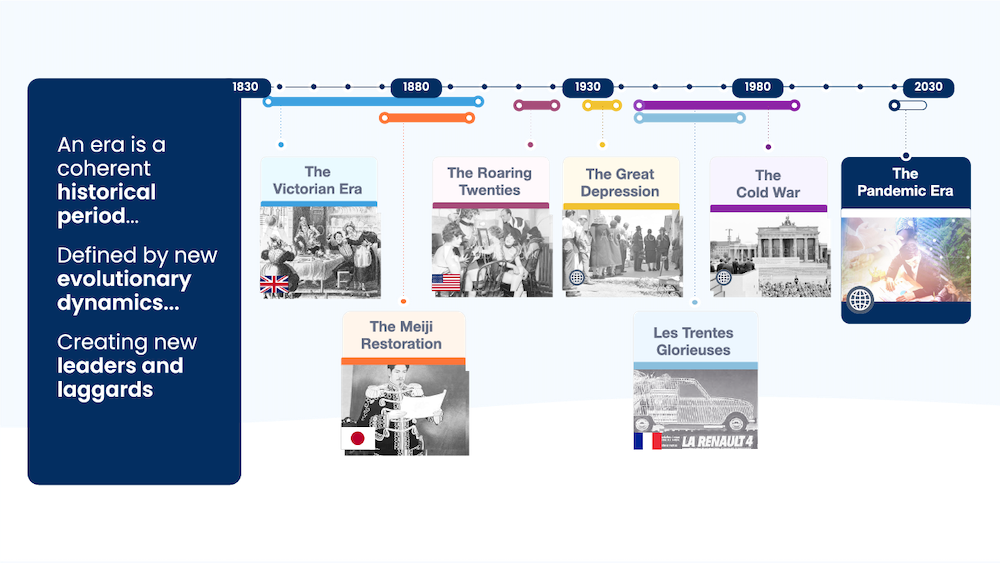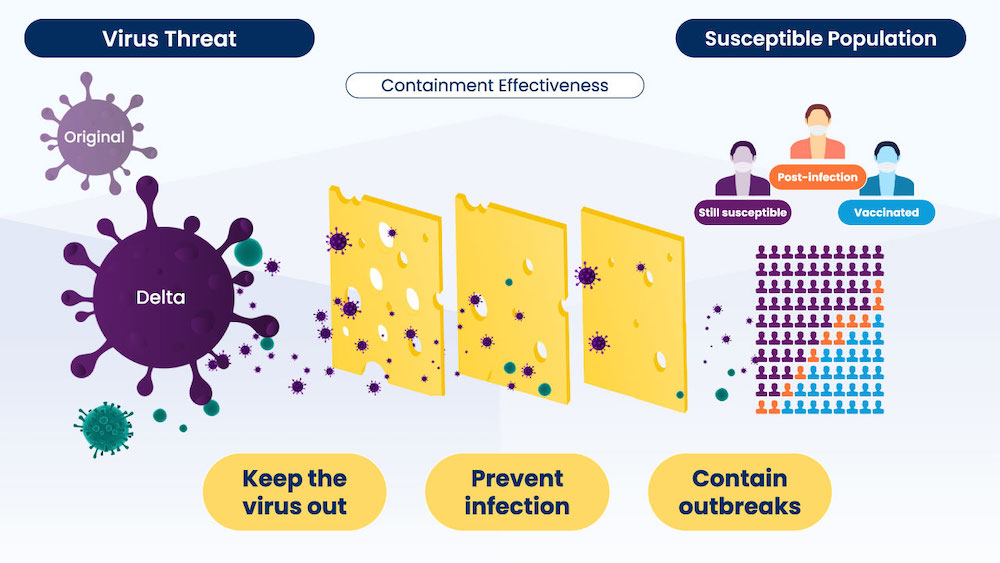We’re in a new pandemic world. While we’ve made significant progress in developing vaccines and understanding COVID-19, the Delta variant has dragged us all back to an uncomfortably high degree of uncertainty about how the virus will continue to impact our lives and livelihoods.
When we consider challenges like climate change, rising inequalities, social injustice, a new focus on health and balance in our lives, and geopolitical tensions, these uncertainties only multiply. It’s clear there’s no going back to the pre-pandemic status quo. This new era will be shaped by the pandemic crisis, our response to it, and by our ability to address and navigate these wider trends. It will deliver a sustained period of rapid change for business leaders of all kinds. While risks remain, we see new forms of competitive advantage emerging for businesses that can sense the possible directions of change and build agility and resilience to adapt to coming shifts.
“While risks remain, we see new forms of competitive advantage emerging for businesses that can sense the possible directions of change and build agility and resilience to adapt to coming shifts.”
Peter Schwartz, SVP of Strategic Planning, Salesforce
Business leaders everywhere are now asking two fundamental questions as they look ahead and grapple with strategic decisions:
1. Are we ready to navigate an uncertain future?
2. What are the keys to responsible and sustainable growth?
To answer these questions, I’ve been working with my team at Salesforce Futures, our partners at Accenture Research, and experts across a variety of disciplines, such as Dr. Larry Brilliant, one of the world’s leading epidemiologists, and economic and policy experts like historian Niall Ferguson and Martin Wolf of The Financial Times. We’re completing new scenarios for the next five years—what we’re calling the Pandemic Era.

The exercise reminds us how useful scenarios are at a time of such uncertainty. In fact, I expect we’ll see a renewed commitment to scenario planning as a management tool. This means greater investments in capabilities to track developments, routinely re-evaluate data, and generate insight-driven options that help businesses become more agile and resilient.
Our work suggests three very different possibilities for the business environments that should shape strategic choices today. Here, we lay out the scenarios and begin to suggest some initial strategic options. In the coming days, we will go into more depth on how businesses can prepare themselves for the uncertain future.
Variants vs. Vaccines
Over a year ago, we began to confront the pandemic with an enormous amount of uncertainty. We didn’t know how the virus would behave, whether or not we’d have a vaccine, and how the economic and political repercussions would unfold.
“The fight will continue to be especially hard in developing countries where they don’t have the same resources, strength of governance, and access to vaccines.”
Peter Schwartz, SVP of Strategic Planning, Salesforce
On one hand, some of our questions have been resolved. We now understand the virus, know what containment measures work, and have effective vaccines.
On the other hand, the virus now spreads far faster, and it continues to mutate. Will it develop a variant that out-spreads Delta, and perhaps is better at evading vaccines, or will it degrade? Will growing public fatigue on masking and social-distancing weaken policy responses? Will vaccine hesitancy grow? Will we become more committed to containment and vaccination, even if a booster becomes necessary every year, or see many people turn away from the fight and tolerate the consequences? These are the questions that will determine how long we stay in this pandemic.

We now have to expect ups and downs around the world as we see the answers play out differently in different places. Consider New Zealand, which has done a brilliant job since the beginning of the pandemic but recently saw an alarming outbreak. A similar story is playing out in Australia and Japan. Some parts of the U.S. are doing very well, but others are struggling, such as Mississippi, Texas, and Florida. The fight will continue to be especially hard in developing countries where they don’t have the same resources, strength of governance, and access to vaccines. Just to take one example, our hearts are all with those in India, which is a major vaccine producer and yet has suffered a substantial economic contraction and severe health impacts from the Delta onslaught.
Bet on the Uplift
Overall, however, our analysis finds that, while there are many possible paths, there’s a greater likelihood that the world economy will regain robust economic growth, even if inflationary pressures complicate that outcome in the short-term. Delta could be the worst variant, we’re getting better at containment, vaccination is scaling up fast, and the base case for geopolitics is that tensions remain at a simmer. This is why we’re continuing to advise businesses to bet on the upside while putting in place strategies to deal with increased uncertainty and possible negative surprises.
“We’re continuing to advise businesses to bet on the upside while putting in place strategies to deal with increased uncertainty and possible negative surprises.”
Peter Schwartz, SVP of Strategic Planning, Salesforce
Our Uplift scenario describes a world of sustained growth with strong state presence, where governments succeed to a surprising degree at both containing the virus and supporting a rapid and broad-based recovery. Growing social movements sustain the shift towards more interventionist government, and the most successful businesses are those that play a part in green and equitable growth.
Consider a Shakeout
The odds favor upside scenarios but we should all be aware how those could go awry. Three possibilities are particularly powerful: we could face a variant significantly worse than Delta; inflation could spiral out of control; or, geopolitical tensions could block cooperation.

If inflation isn’t transitory, we would see interest rates rise and, possibly, a recession that punctures today’s confidence in strong government action. This would create a shake-out in a variety of sectors, threatening companies that would be particularly vulnerable in a harsh economic environment. However we also see a positive ending to such a scenario, with recovery spurred by a wave of creative destruction enabled by a return to a globalized economy, perhaps tolerating higher COVID risks. Those in the position to take the greatest risks and to innovate would reap much of the rewards.
Watch for Fault Lines
Our third scenario considers the possibility that a variant worse than Delta pushes governments to protect their economies in ways that push globalization further into retreat. Border controls could be strengthened, disrupting supply chains and the flow of data. As countries become more inward-looking and blame for the ongoing pandemic spreads, geopolitical temperatures might rise, further fracturing the world into multiple blocs. In this lower-growth scenario, we could see many global organizations shift to a model of regional autonomy and take a more conservative approach to their balance sheet.
No Regret Strategies
Winning in the marketplace could take many different forms in the coming five years, but certain strategies are robust across nearly all scenarios we explored.
At risk of stating the obvious, the first priority for businesses should be to do everything in their power to help end the pandemic and protect the health of their customers and staff. Businesses have a unique role to play, applying their reach and agility to scale COVID-safe practices and innovations as the situation evolves. Their position at the coalface of human interactions makes them credible advocates of sound, science-based public health policy.
Alert to the growing demands and needs of stakeholders, companies should accelerate their sustainability transformation and build business models to address the strong green growth opportunities we see under all scenarios.
But the pandemic has also increased expectations that businesses should put environmental stewardship at the heart of their own operations. And in parallel, it has intensified the demand that they address a wider range of stakeholder and societal needs in the business they do and the way they do it. The new rules of competitive advantage will therefore require them to advance inclusion, equity and diversity throughout their organizations and wider ecosystems.
“The new rules of competitive advantage will therefore require [businesses] to advance inclusion, equity and diversity throughout their organizations and wider ecosystems.”
Peter Schwartz, SVP of Strategic Planning, Salesforce
Next, as many have pointed out, the pandemic accelerated the already-rapid adoption of digital tools for collaborating internally and serving customers, and that acceleration continues. Customers now expect smooth digital engagement, employees expect the flexibility to work from home, and the most successful businesses are taking this as an opportunity to creatively reinvent their workflows around today’s capabilities.
That reinvention needs to go far deeper than adopting new tools. Companies must also invest in the skills and wellbeing of their people to help them work productively in new hybrid environments. To find opportunity in this fast-changing environment, and pivot quickly enough to take advantage, companies will need to achieve a very high degree of organizational agility. That means restructuring into more fluid and modular organizations and teams, shifting incentives to reward risk-taking and investing in employees’ digital fluency. Competently delivering on the digital potential will deepen trust and earn loyalty.
Finally, every organization should recognize the status quo is dead and begin the hunt for the futures that are emerging. That means building data-rich sensing capabilities to improve their understanding of fast-changing consumer changes, anticipate supply chain disruptions and spot new market opportunities. They will also need new technologies to decentralize decisions to the edge, helping them pursue bold innovation and experiment with new possibilities. And, they will need to maintain a robust financial position to pursue opportunities on the upside scenarios and protect against losses on the downside.
As the pandemic era creates new uncertainties and opportunities, it renews the case for scenario planning to be at the heart of strategic decision-making. This is the time to surf ahead of the wave.




















